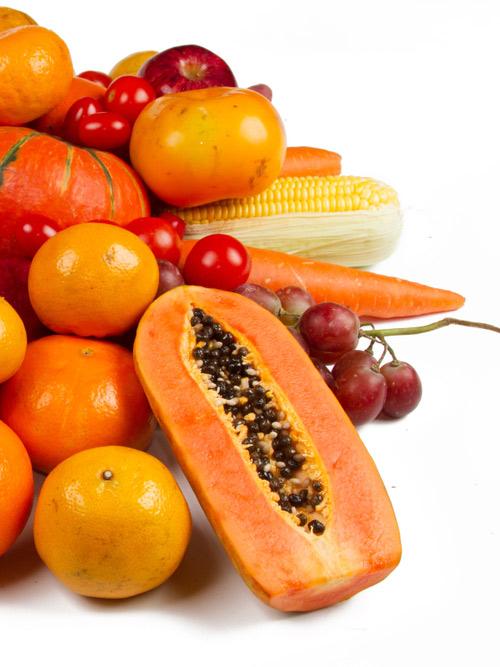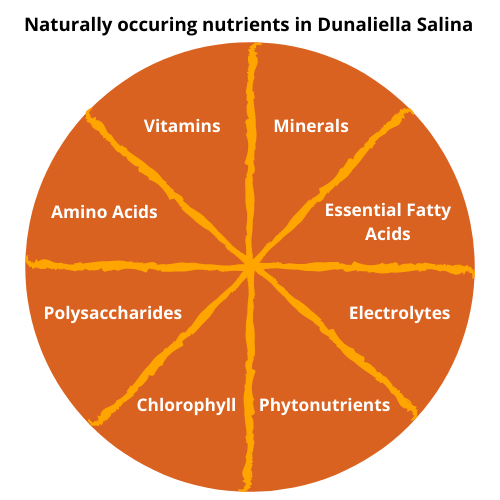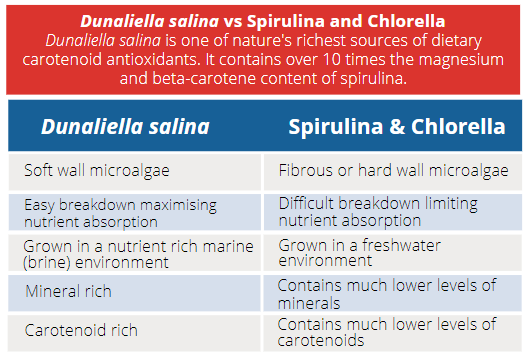- Home
- /
- Algotene II: 300 mg...

Algotene II
Natural Marine Algae | Red Marine Phytoplankton
Whole dried Dunaliella salina
Supports immune system health, healthy eyesight and general wellbeing.
Hippocrates said:
“Let food be thy medicine and medicine be thy food”

√ Vitamins
√ Minerals
√ Amino Acids
√ Essential fatty acids EFAs
√ Electrolytes
√ Polysaccharides
√ Chlorophyll
√ Phytonutrients

Dunaliella salina is one of the richest sources of dietary beta-carotene and mixed carotenoids.
Farmed in shallow saltwater lakes with pure sunlight for energy, the algae protects itself from the harsh conditions by producing high levels of mixed carotenoids
Under the right conditions, the phytoplankton accumulates large amounts of bio-available nutrients particularly beta-carotene, which is an antioxidant and supports healthy eyesight, immune system function and general health and well-being.

Why take Algotene?
Always read the label.
Marine Phytoplankton: Functional food and natural medicine.
Dunaliella salina is one of nature’s most nutrient dense foods and natural medicines. It is a soft wall phytoplankton, making it very easy to digest, particularly for the elderly. It contains many of the antioxidants commonly found in fruit and vegetables. Dunaliella salina is a natural source of vitamins, minerals, amino acids, polysaccharides, essential fatty acids, chlorophyll and phytonutrients.
What do the experts think?
Nutritionists and natural health practitioners agree that we need to increase the amount of plant based foods in our diet. The best foods are organically produced whole foods served with minimal processing. Marine phytoplankton is one such food. Although only a tiny single cell, Dunaliella salina is a whole plant that naturally contains a broad spectrum of macro and micronutrients.


Benefits of Dunaliella salina vs Spirulina
Dunaliella salina is one of nature’s richest sources of dietary carotenoid antioxidants and contains over 20 times the beta-carotene content of spirulina. Information Source: Dunaliella salina – National Measurement Institute (Australia) and Craft Technologies Inc. (USA). Spirulina and carrots
– USDA National Nutrient Database for Standard Reference, (Release 27) USA NB Nutrient levels will vary from batch to batch.

Antioxidant
Dunaliella salina contains a mix of natural carotenoids including beta carotene, alpha carotene, lutein, zeaxanthin and cryptoxanthin. Carotenoids are the pigments responsible for the red, orange, yellow and green colours of fruit and vegetables. Beta carotene reduces free radicals formed in the body.
Dunaliella salina can accumulate large amounts of β-carotene under appropriate conditions, in the range of 8–14% of its total dry weight. β-Carotene produced by D. salina consists of both cis and trans isomers and a high antioxidant potential compared with synthetic β-carotene, which consists predominantly of trans isomers. Xanthophylls (lutein and zeaxanthin) and polyphenols are other potential algal antioxidants.
Studies on Dunaliella sp. have revealed that Dunaliella biomass or its extracts have a positive effect on the treatment of cardiovascular diseases and they exhibit immunomodulatory and anti-inflammatory properties. There is current research looking at it’s positive effect on the microbiome,



